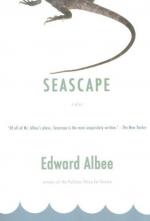|
This section contains 316 words (approx. 1 page at 400 words per page) |

|
Seascape Summary & Study Guide Description
Seascape Summary & Study Guide includes comprehensive information and analysis to help you understand the book. This study guide contains the following sections:
This detailed literature summary also contains Bibliography and a Free Quiz on Seascape by Edward Albee.
With Seascape, American playwright Edward Albee won his second Pulitzer Prize for drama. Albee himself directed this Broadway production, which opened on January 26, 1975, at the Sam S. Shubert Theatre. The play was published by Atheneum that same year. Like many of Albee's plays, Seascape focuses on communication in interpersonal relationships, in this case between couples. Albee's first successful play, Who's Afraid of Virginia Woolf? (1962), and his first Pulitzer Prize-winning play, A Delicate Balance (1966), also concerned this topic. Seascape is different from these dramas on several counts. The play is not strictly a drama but, according to various critics, has elements of comedy, fantasy, satire, and/or absurdism. In Seascape, Nancy and Charlie, an American couple on the verge of the major life change of retirement, are having problems in their relationship. They are discussing these matters on the beach when another couple appears, two human-sized lizards named Leslie and Sarah who speak: and act like people. The lizards have evolved to such a degree that they no longer feel at home in the sea and are compelled to seek life on the land What the lizards experience with Nancy and Charlie nearly drives them back to the sea, but with an offer of help from the human couple, they decide to stay. This relatively happy ending is not common in many of Albee's previous plays, and some critics find it refreshing. Critics are divided in their opinion of the play and its content. Some believe it is witty and original, while others find it to be pompous if not gimmicky, primarily because of the lizard characters. One critic who found Seascape noteworthy, Clive Barnes of the New York Times, writes, "it is a curiously compelling exploration into the basic tenet of life. It is asking in a lighthearted but heavy minded fashion whether life is worth living. It decides that there is no alternative."
Read more from the Study Guide
|
This section contains 316 words (approx. 1 page at 400 words per page) |

|



